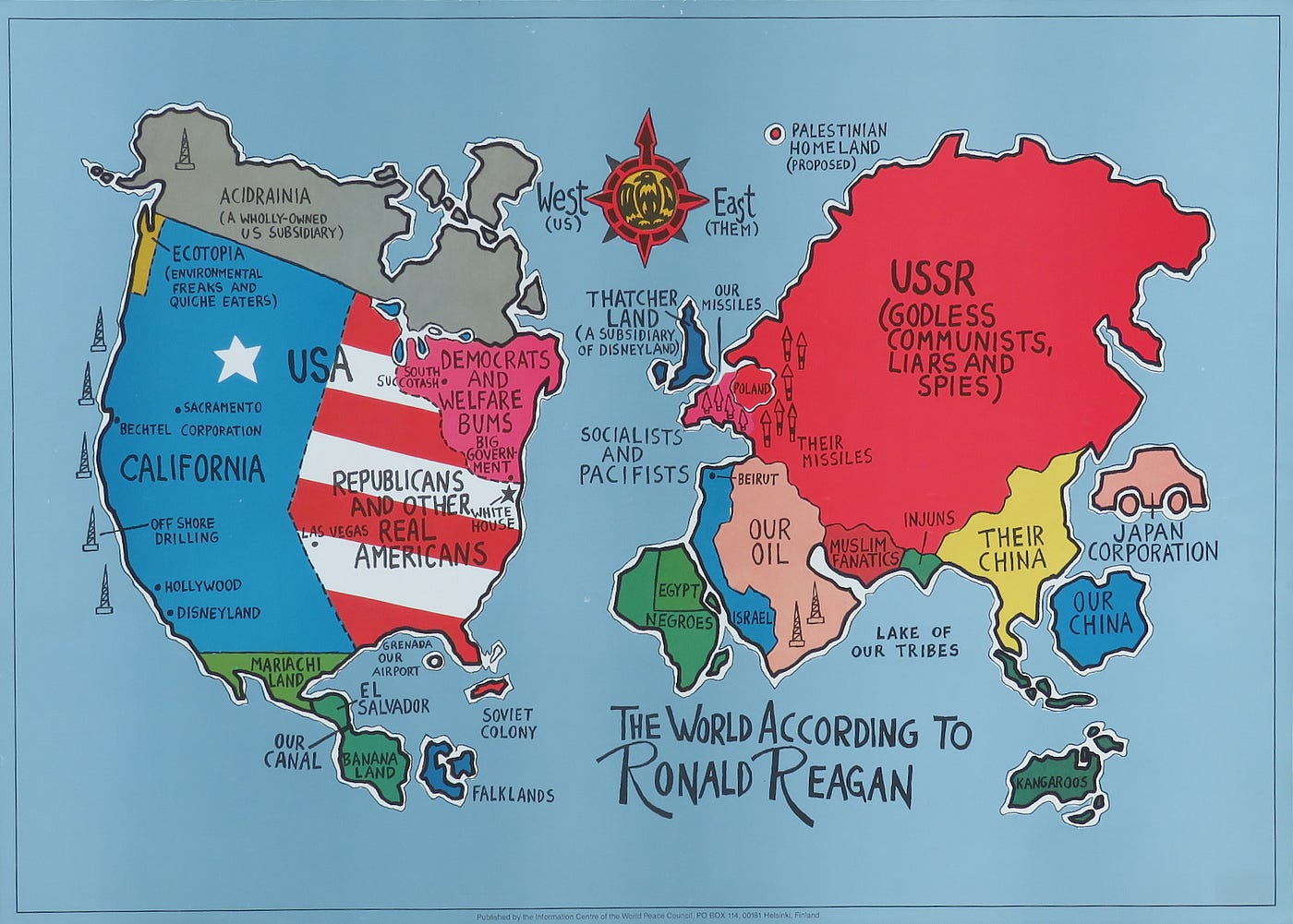
Anyone else remember this old map from the 1980s? It was a satirical commentary about Ronald Reagan’s worldview, who, for those of you too young to remember, was the last Republican president that modern Republicans would consider to be too liberal to vote for today.

Love him or hate him, what sets Reagan apart was how he regarded California as an outsized player in the global ecosystem. He was a Californian to the core, which was required in order to get anything done in this state, with its complex political, geological, agricultural, economic, and social diversity, and of course, its cultural insanities.
Reagan skillfully navigated the difficult and strange politics of this unique state by using the time-honored Californian tradition of not making any decisions in life — be they intimate matters of one’s personal relationships, or as the leader of the free world — without consulting his astrologer first. Yes, despite Reagan’s handicap of being a lowly Aquarius, he was still able to gain respect from leading Democrats. When Speaker of the House Jim Wright learned of Reagan’s use of astrologers, he replied, “It’s all right with me. I’m glad he consults somebody.”
The point is, getting anything done in California politics is hard, but to fully explain why, well, that’s also hard. If aliens landed here from another planet and wanted us to explain it to them, the answer would vary dramatically, depending on whom they asked.
If they asked a Republican, an ICE van would be immediately summoned, and they’d be driven to Mexico.
If they asked a Democrat, they’d be told to hop in a Prius and enjoy a fine Napa Valley chardonnay.
If they asked Ezra Klein, he’d tell them to read his recently published article in the New York Times titled, “California Is Making Liberals Squirm.”
To be sure, Klein’s article isn’t intended to be about California, per se. It’s supposed to be about the far-left corner of the liberal wing of the Democratic party euphemistically called “progressives.” Klein’s thesis is that progressive policies are going to be very, very hard to implement anywhere, as evidenced by the fact that even San Francisco, the stereotypical poster child of extreme liberal progressive politics, can’t do it. One example he cites is housing, where many San Franciscans have been advocating for laws to assist in building more affordable housing, yet these same people don’t vote for those very policies.
You can imagine how the street demonstrations might go: A guy is yelling to a crowd of supporters through a bullhorn somewhere in the Castro District.
Guy with Bullhorn: What do we want?!
Crowd: Affordable housing and a $15 minimum wage!
Guy with Bullhorn: Where do we want it?!
Crowd: Anywhere but HERE! And by “here” we mean the whole Bay Area. How about Sacramento? Or Maybe L.A.! Yeah, there! They steal our water!
Klein says that this illustrates just how hard this problem is to solve writ large: If even a progressive city like San Francisco can’t address progressive issues, how can we possibly expect these policies to be implemented anywhere else?
Klein attempts to explain this by reducing California to this: “We’re often symbolically liberal, but operationally conservative.” He cites countless progressive agendas that Californians have tried to pass, only to be stopped by the same voters that called for them. “Once you see this pattern, you see it everywhere,” he says as though he’s hit on something we all didn’t already know.
Of course, he’s right. But, not exactly right. Just partially so. And it’s that important detail — why not exactly — that exposes the little crack in Klein’s whole argument about California (not progressivism). His attempt to make any connection between how things are done in California and any other state is, as the celebrated political scientist Norman Finkelstein famously said, mishegas.
If we’re going to talk about California’s bipolar citizenry, Klein’s observations are a tiny bit of shaved ice on the proverbial iceberg. He’s right, but he’s only begun to appreciate the scale of this state’s weirdities.
And by “weird,” I don’t mean Florida weird. That state, which I call the Orange County of the East Coast, holds the world’s cup on weirdness. When you combine naked guys and alligators, you just can’t beat Florida. When Disney was considering building its second theme park after Anaheim, the board got together and asked this basic socioeconomic question, “What state, other than California, attracts people who will do and believe anything, including entirely surreal fantasies, and will pay top dollar to live there?”
The meeting probably lasted five minutes.
Nor is this pattern limited to left-leaning liberals. The right-leaning conservatives also have their own paradoxes in how they aren’t really like the rest of the country’s Republican base, as illustrated by Ben Boychuk’s article in the Sacramento Bee titled, “Understanding the weird world of California conservatives”:
… there is not a single “California conservatism.” The right-wing populism of L.A.-based Breitbart News is not in the same intellectual neighborhood as the Claremont Review of Books, which published Michael Anton’s influential (and highly controversial) “The Flight 93 Election.” Mashing them all together is like grafting cat legs to a dog’s body.
Conservatives in California lose because all they do all day is talk about ideas — ideas untested by experience or utterly rejected by voters. If the purpose of politics is to win, then maybe the ideas are no good? Maybe come up with better ideas? Maybe California conservatives should talk to actual people?
People think California is liberal — it’s not. It’s a really interesting blend of weird, both on the left and the right. Like a fine rosé you might find in Napa for $45/bottle (but costs $15.95 at Safeway, but only if you buy six at a time), the politics here can be summed up by a quote from Daniel Patrick Moynihan: “The central conservative truth is that it is culture, not politics, that determines the success of a society. The central liberal truth is that politics can change a culture and save it from itself.”
And that nice, tasty witticism can be paired with this fine quote from Mark Shields: “An ideologue believes what’s right works, while a pragmatist believes what works is right.”
The thing about California is that its citizens are both ideologues and pragmatists, which confuses people from other states, whose citizens may well have both, but not among the very same people. That’s what makes California unique and different, and why you cannot extrapolate what happens here to whether something might work somewhere else.
Explaining California is like describing what you see on a Rorschach test while you’re on acid as you listen to The Grateful Dead: There are so many things going on in a single picture, you’ll see any pattern you want to see, real or not. Anyone’s view or explanation of California is just as legitimate as anyone else’s.
The accuracy of Klein’s particular perspective is also spot-on as well, like the rubber-duckie game for little kids you see at a carnival. The child picks one of the hundreds of rubber duckies in a water tub, and if it has a star underneath, he wins a small stuffed animal. The secret is that every duck has a star, so the child wins every single time. The game works because everyone’s a winner: The child is happy, the parents are happy, and the business works because parents pay $1 to play, but the toy only costs the vendor $.50.
Same thing with explaining California. No one’s wrong, and any article published about it gets circulated around as though there’s this new insight into California. So, Ezra Klein wins a small stuffed animal for correctly explaining California politics.
Everyone wins, that is, except for Californians. We’re like the parents of that child that won the stuffed animal because, in reality, it was a cheap knockoff made in China that immediately fell apart five minutes after the child started playing with it.
But it doesn’t stop there. The child’s screams are so bad, it’s upsetting other patrons, even those in the insanely noisy bumper cars attraction on the other side of the roller coaster. Embarrassed, the parents decide to go home. After five hours of traffic returning to San Francisco (from San Jose), they navigate the various one-way streets to their upscale neighborhood in Pacific Heights, where they now have to spend another 45 minutes looking for a parking spot because their own garage was converted into an illegal rental unit in order to pay for the outrageous mortgage. Oh, look, there’s a parking spot in front of the homeless guy shooting up under the nicely decorated BLM sign posted on the gate next to a gorgeous Victorian home. Hint: There’s a reason that spot is not taken.
So, Klein’s fanciful observations about California are all correct, but to assert that if policies can’t work here, “how can they work anywhere?” is a bit silly. In case you can’t tell, nothing works here. At least, not well. Or rather, not well enough to satisfy everyone. Perhaps that’s by design.
But that has no bearing at all on whether similar policies can work elsewhere. In fact, I’d say that almost anywhere else has a far better chance of achieving progressive policies before California can. That’s okay, we’ll catch up later and then take credit for it.
Now that you have a better understanding of California, let’s return to that alien species that wants to know where they are. You wouldn’t say, “Well, you see, we have Democrats, Republicans, rich people, poor people, and people of color. We also have schools that we have to rename because the people we once revered as great are now horrible because… Okay, never mind, it’s complicated. Here, watch these cat videos on YouTube…”
No, you’d have to start at a much higher meta-level: “You see, we humans are weird in that we have these complex intertwinings of cognitive patterns, ranging from emotional drives to intellectual faculties, and many of these run contrary to one another. This means that when we try to self-govern, you’re going to get a weird conglomerate of people and circumstances that we call ‘California.’”
You then surrender to the alien species and ask them to take you away.
Sign up for The Bold Italic newsletter to get the best of the Bay Area in your inbox every week.







